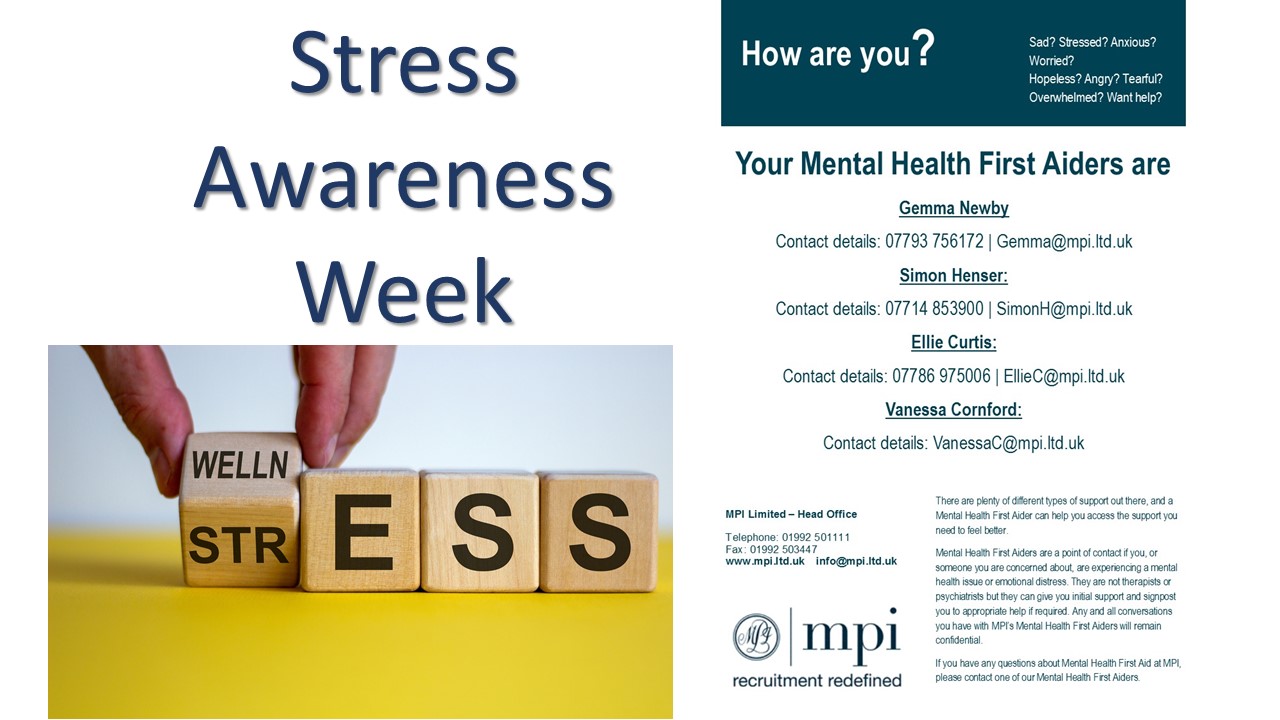
Stress Awareness Week
Stress!!
We all experience at some point in our life and I am sure we could all give a definition of what it is. Stress is the feeling of being under too much mental or emotional pressure. When you are stressed, your body releases stress hormones such as adrenaline and cortisol. Stress is your body’s reaction to help you deal with pressure or threats. This is sometimes called a "fight or flight" response. Your stress hormone levels usually return to normal once the pressure or threat has passed. However it is important to recognise when it doesn't go back to normal and to reach out for help when that happens as it can lead to mental health problems or heighten those you are already suffering from or managing. It is also important to recognise signs in others so you can reach out incase they feel unable to ask for help themselves.
The last 18 months have given the world a stressor unlike most people have ever experienced. This winter I think we all hoped that stress would be improving but it is becoming clear that the ripple effects will reach long into the future and are still causing stress for people. Research shows that mental health diagnosis' have more than doubled since the start of the pandemic and I am sure many can testify even before the pandemic, levels were at a devastatingly high amount. But are the diagnosis' just the tip of the iceberg? For example, at some point in the last year, 74% of us have felt so stressed that we have felt unable to cope (Mental Health Foundation). This many not have lasted so long that a diagnosis was made but it what about next time?
Stress Awareness Week was started in 2018 to highlight stress prevention 20 years after Stress Awareness Day was started for the same reasons. It is recognised all around the world and this year a Summit was held to highlight and erase the stigma associated with stress and mental health issues. It was online and allowed everyone to access to the areas that interested them. It had a real workplace theme this year after all the changes to the workplace people have been through this year to highlight what has worked, what has caused problems and how we can manage the workplace as we come out of the pandemic.
Here are some top tips for dealing with stress:
1. Be Active. Exercise won't make stress disappear but it may reduce the intensity and give you some needed thinking time.
2. Take Control. Some things may feel insurmountable but small changes may make a difference so take control of the problem because feeling out of control will make you feel worse.
3. Connect with People. A good support network of colleagues, friends and family can ease your work troubles and help you see things in a different way. The activities we do with friends help us relax. We often have a good laugh with them, which is an excellent stress reliever.
4. Have Some "Me" Time. In the UK we work more hours than any other European country. It important to make time every week to do something you enjoy, a hobby, time with family, whatever makes you feel like you.
5. Challenge Yourself. Achieving something is such a confidence boost so set yourself a challenge, build your confidence and lower your stress.
6.Avoid Unhealthy Habits. Often when stressed we turn to alcohol, food, caffeine or other vices. Make sure they maintain at a healthy level and don't make your physical health as bad as your mental health.
7. Help Other People. Evidence shows that people who help others, through activities such as volunteering or community work, become more resilient. "Helping people who are often in situations worse than yours will help you put your problems into perspective". If you don't have time to volunteer, try to do someone a favour every day. It can be something as small as helping someone cross the road or going on a coffee run for colleagues.
8. Try To Be Positive. It is so hard to be positive when stressed or depressed but try to find one thing a day that you are happy about. Then why not challenge yourself to find two or three.
9. Sleep. It is probably the hardest one to achieve when stressed but will make the biggest difference. Lack of sleep makes our mental and physical health worse so try as many techniques for better sleep as you can till you find one that works. A massage, meditation, a book, a bath, herbal sprays like lavender? FInd what works for you.
But if nothing is working don't be afraid to reach out for help.
At MPI we are very lucky to not only have a supportive and strong leadership team but to also have several mental health first aiders we can call on at any time we feel we need it. Whether you are a permanent internal member of staff or a contractor with one of our clients if you need someone to talk to don't hesitate to pick up the phone to one of them.
